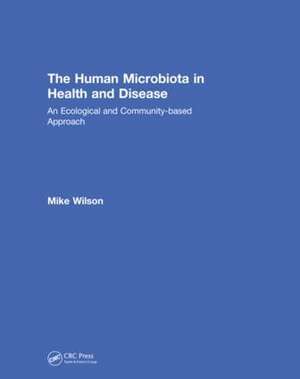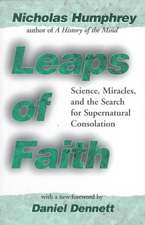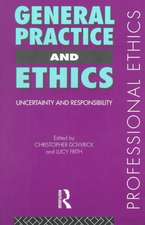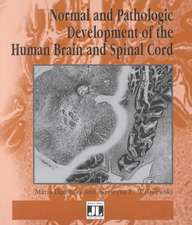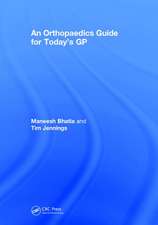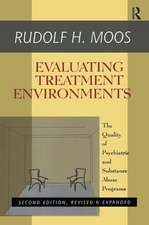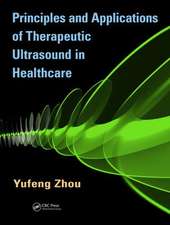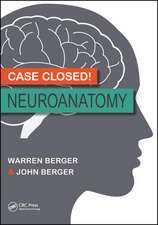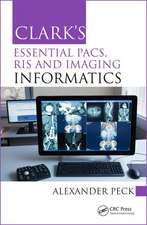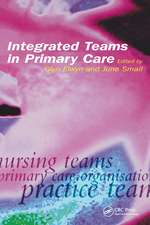The Human Microbiota in Health and Disease: An Ecological and Community-based Approach
Autor Michael Wilsonen Limba Engleză Hardback – 7 sep 2018
It is increasingly being recognized that the indigenous microbiota plays an important role in maintaining the health of its human host. However, changes in the overall composition of a microbial community at a body site, or an increase in the proportion of a particular species in that community, can result in disease or other adverse consequences for the host.
The Human Microbiota in Health and Disease: An Ecological and Community-Based Approach describes the nature of the various communities inhabiting humans as well as the important roles they play in human health and disease. It discusses techniques used to determine microbial community composition and features a chapter devoted to the many factors that underlie this mammalian–microbe symbiosis. Uniquely, the book adopts an ecological approach to examining the microbial community’s composition at a particular body site and why certain factors can shift a community from a eubiotic to a dysbiotic state.
The book is for undergraduates and postgraduates on courses with a module on the indigenous microbiota of humans. It will also be useful to scientists, clinicians, and others seeking information on the human microbiota and its role in health and disease.
| Toate formatele și edițiile | Preț | Express |
|---|---|---|
| Paperback (1) | 513.63 lei 6-8 săpt. | |
| CRC Press – 10 sep 2018 | 513.63 lei 6-8 săpt. | |
| Hardback (1) | 1234.04 lei 6-8 săpt. | |
| CRC Press – 7 sep 2018 | 1234.04 lei 6-8 săpt. |
Preț: 1234.04 lei
Preț vechi: 1644.66 lei
-25% Nou
Puncte Express: 1851
Preț estimativ în valută:
236.16€ • 246.24$ • 196.27£
236.16€ • 246.24$ • 196.27£
Carte tipărită la comandă
Livrare economică 21 martie-04 aprilie
Preluare comenzi: 021 569.72.76
Specificații
ISBN-13: 9781138342781
ISBN-10: 1138342785
Pagini: 504
Ilustrații: 970
Dimensiuni: 219 x 276 mm
Greutate: 1.81 kg
Ediția:1
Editura: CRC Press
Colecția Garland Science
ISBN-10: 1138342785
Pagini: 504
Ilustrații: 970
Dimensiuni: 219 x 276 mm
Greutate: 1.81 kg
Ediția:1
Editura: CRC Press
Colecția Garland Science
Public țintă
Postgraduate and ProfessionalCuprins
Preface
Author
Abbreviations used for Microbial Genera
Glossary
1. The Human Microbiota— A Historical and Methodological Overview
2. The Human–Microbe Symbiosis
3. The Indigenous Microbiota of the Skin
4. The Indigenous Microbiota of the Respiratory System
5. The Indigenous Microbiota of the Genitourinary System of Males
6. The Indigenous Microbiota of the Urinary System of Females
7. The Indigenous Microbiota of the Reproductive System of Females
8. The Indigenous Microbiota of the Oral Cavity
9. The Indigenous Microbiota of the Gastrointestinal Tract
10. Microbial Community Disruption—A Role in Other Human Diseases?
11. The Indigenous Microbiota of Humans—Where Are We Now and Where Should We Be Going?
Appendix 1: Human Antimicrobial Peptides and Proteins
Appendix 2: Distinguishing Characteristics of Those Genera That Are Frequently Mentioned in This Book
Index
Author
Abbreviations used for Microbial Genera
Glossary
1. The Human Microbiota— A Historical and Methodological Overview
2. The Human–Microbe Symbiosis
3. The Indigenous Microbiota of the Skin
4. The Indigenous Microbiota of the Respiratory System
5. The Indigenous Microbiota of the Genitourinary System of Males
6. The Indigenous Microbiota of the Urinary System of Females
7. The Indigenous Microbiota of the Reproductive System of Females
8. The Indigenous Microbiota of the Oral Cavity
9. The Indigenous Microbiota of the Gastrointestinal Tract
10. Microbial Community Disruption—A Role in Other Human Diseases?
11. The Indigenous Microbiota of Humans—Where Are We Now and Where Should We Be Going?
Appendix 1: Human Antimicrobial Peptides and Proteins
Appendix 2: Distinguishing Characteristics of Those Genera That Are Frequently Mentioned in This Book
Index
Notă biografică
Professor Michael Wilson is emeritus Professor of Microbiology at University College London (UCL), where he has worked since 1983. He has taught students on Bachelor and Master’s courses in microbiology covering many aspects of the subject, including the human microbiota, infectious diseases, bacterial pathogenesis, microbial biofilms, infection control, and antimicrobial chemotherapy.
He also actively engaged in research at UCL, and in recognition of his research achievements, he was awarded a DSc in 1999 by the National University of Ireland and in 2011 was appointed Chevalier dans l’Ordre des Palmes Académiques by the French Minister of National Education. His main research interests are the indigenous microbiota of humans, biofilms, bacterial pathogenesis, antibiotic resistance, and the development of new antimicrobial strategies. He has a great interest in translational research and has applied for 13 patents for inventions in the fields of light-activated antimicrobial agents and water purification. In 1990 he received the National Westminster/British Petroleum Innovation Award and in 1991 the Toshiba "Invention of the Year" Award for inventing a low-technology method of sterilizing water for use in developing countries.
He has published 334 peer-reviewed scientific papers, 238 conference abstracts, and 11 books, one of which, Bacteriology of Humans: An Ecological Perspective, was awarded the first prize in the Royal Society of Medicine and Society of Authors Medical Book Awards in 2008. He has supervised the research projects of 35 PhD students and 46 MSc students.
He is also enthusiastic about communicating the results of his research to the general public. Consequently, he has organised exhibitions for, and given talks to, the public on a number of topics including the human microbiota, antibiotic resistance, and light-activated antimicrobial agents.
He also actively engaged in research at UCL, and in recognition of his research achievements, he was awarded a DSc in 1999 by the National University of Ireland and in 2011 was appointed Chevalier dans l’Ordre des Palmes Académiques by the French Minister of National Education. His main research interests are the indigenous microbiota of humans, biofilms, bacterial pathogenesis, antibiotic resistance, and the development of new antimicrobial strategies. He has a great interest in translational research and has applied for 13 patents for inventions in the fields of light-activated antimicrobial agents and water purification. In 1990 he received the National Westminster/British Petroleum Innovation Award and in 1991 the Toshiba "Invention of the Year" Award for inventing a low-technology method of sterilizing water for use in developing countries.
He has published 334 peer-reviewed scientific papers, 238 conference abstracts, and 11 books, one of which, Bacteriology of Humans: An Ecological Perspective, was awarded the first prize in the Royal Society of Medicine and Society of Authors Medical Book Awards in 2008. He has supervised the research projects of 35 PhD students and 46 MSc students.
He is also enthusiastic about communicating the results of his research to the general public. Consequently, he has organised exhibitions for, and given talks to, the public on a number of topics including the human microbiota, antibiotic resistance, and light-activated antimicrobial agents.
Recenzii
'The Human Microbiota in Health and Disease is the first edition of an extraordinary updated academic resource, which provides an exhaustive description of the nature and diversity of the microbial communities inhabiting the human body.
Each chapter is magnificently illustrated, contains several graphic charts and detailed tables, and terminates with a key concept list, review questions and an updated bibliography divided by topics.
Overall, the book is a valuable resource for students, researchers and anyone interested in the human microbiota and its impact on health and disease.'
Dr Fabio Giocannercole, Sapienza University of Rome, Microbiology Today 46:2
Each chapter is magnificently illustrated, contains several graphic charts and detailed tables, and terminates with a key concept list, review questions and an updated bibliography divided by topics.
Overall, the book is a valuable resource for students, researchers and anyone interested in the human microbiota and its impact on health and disease.'
Dr Fabio Giocannercole, Sapienza University of Rome, Microbiology Today 46:2
Descriere
This book describes the various microbial communities (microbiota) inhabiting humans as well as their important roles in human health and disease. An ecological approach has been adopted throughout the book to explain why the microbial community at a particular body site has a particular composition when in balance with the host (eubiosis).
